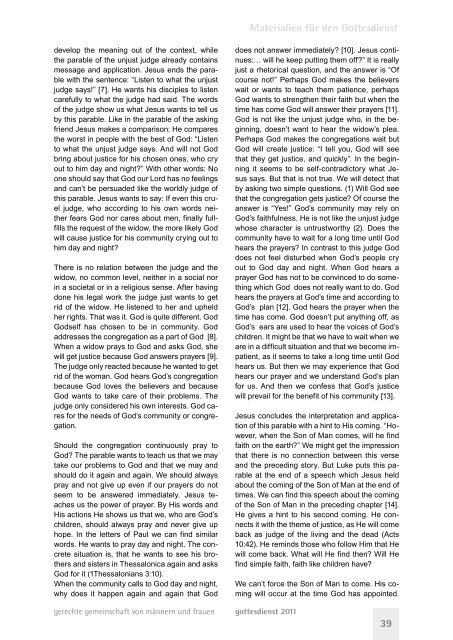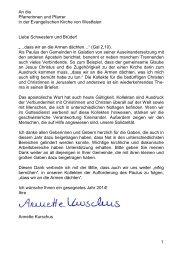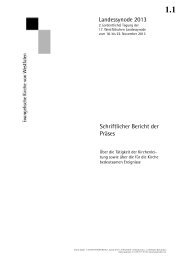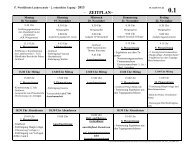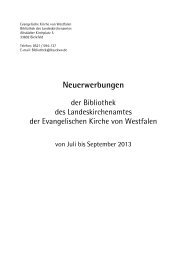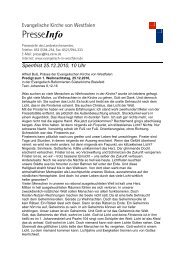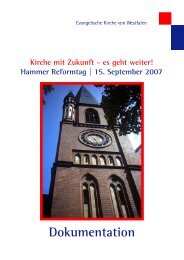West Papua - Evangelische Kirche von Westfalen
West Papua - Evangelische Kirche von Westfalen
West Papua - Evangelische Kirche von Westfalen
Sie wollen auch ein ePaper? Erhöhen Sie die Reichweite Ihrer Titel.
YUMPU macht aus Druck-PDFs automatisch weboptimierte ePaper, die Google liebt.
develop the meaning out of the context, while<br />
the parable of the unjust judge already contains<br />
message and application. Jesus ends the parable<br />
with the sentence: “Listen to what the unjust<br />
judge says!” [7]. He wants his disciples to listen<br />
carefully to what the judge had said. The words<br />
of the judge show us what Jesus wants to tell us<br />
by this parable. Like in the parable of the asking<br />
friend Jesus makes a comparison: He compares<br />
the worst in people with the best of God: “Listen<br />
to what the unjust judge says. And will not God<br />
bring about justice for his chosen ones, who cry<br />
out to him day and night?” With other words: No<br />
one should say that God our Lord has no feelings<br />
and can’t be persuaded like the worldly judge of<br />
this parable. Jesus wants to say: If even this cruel<br />
judge, who according to his own words neither<br />
fears God nor cares about men, finally fullfills<br />
the request of the widow, the more likely God<br />
will cause justice for his community crying out to<br />
him day and night?<br />
There is no relation between the judge and the<br />
widow, no common level, neither in a social nor<br />
in a societal or in a religious sense. After having<br />
done his legal work the judge just wants to get<br />
rid of the widow. He listened to her and upheld<br />
her rights. That was it. God is quite different. God<br />
Godself has chosen to be in community. God<br />
addresses the congregation as a part of God [8].<br />
When a widow prays to God and asks God, she<br />
will get justice because God answers prayers [9].<br />
The judge only reacted because he wanted to get<br />
rid of the woman. God hears God’s congregation<br />
because God loves the believers and because<br />
God wants to take care of their problems. The<br />
judge only considered his own interests. God cares<br />
for the needs of God’s community or congregation.<br />
Should the congregation continuously pray to<br />
God? The parable wants to teach us that we may<br />
take our problems to God and that we may and<br />
should do it again and again. We should always<br />
pray and not give up even if our prayers do not<br />
seem to be answered immediately. Jesus teaches<br />
us the power of prayer. By His words and<br />
His actions He shows us that we, who are God’s<br />
children, should always pray and never give up<br />
hope. In the letters of Paul we can find similar<br />
words. He wants to pray day and night. The concrete<br />
situation is, that he wants to see his brothers<br />
and sisters in Thessalonica again and asks<br />
God for it (1Thessalonians 3:10).<br />
When the community calls to God day and night,<br />
why does it happen again and again that God<br />
gerechte gemeinschaft <strong>von</strong> männern und frauen gottesdienst 2011<br />
Materialien für den Gottesdienst<br />
does not answer immediately? [10]. Jesus continues:…<br />
will he keep putting them off?” It is really<br />
just a rhetorical question, and the answer is “Of<br />
course not!” Perhaps God makes the believers<br />
wait or wants to teach them patience, perhaps<br />
God wants to strengthen their faith but when the<br />
time has come God will answer their prayers [11].<br />
God is not like the unjust judge who, in the beginning,<br />
doesn’t want to hear the widow’s plea.<br />
Perhaps God makes the congregations wait but<br />
God will create justice: “I tell you, God will see<br />
that they get justice, and quickly”. In the beginning<br />
it seems to be self-contradictory what Jesus<br />
says. But that is not true. We will detect that<br />
by asking two simple questions. (1) Will God see<br />
that the congregation gets justice? Of course the<br />
answer is “Yes!” God’s community may rely on<br />
God’s faithfulness. He is not like the unjust judge<br />
whose character is untrustworthy (2). Does the<br />
community have to wait for a long time until God<br />
hears the prayers? In contrast to this judge God<br />
does not feel disturbed when God’s people cry<br />
out to God day and night. When God hears a<br />
prayer God has not to be convinced to do something<br />
which God does not really want to do. God<br />
hears the prayers at God’s time and according to<br />
God’s plan [12]. God hears the prayer when the<br />
time has come. God doesn’t put anything off, as<br />
God’s ears are used to hear the voices of God’s<br />
children. It might be that we have to wait when we<br />
are in a difficult situation and that we become impatient,<br />
as it seems to take a long time until God<br />
hears us. But then we may experience that God<br />
hears our prayer and we understand God’s plan<br />
for us. And then we confess that God’s justice<br />
will prevail for the benefit of his community [13].<br />
Jesus concludes the interpretation and application<br />
of this parable with a hint to His coming. “However,<br />
when the Son of Man comes, will he find<br />
faith on the earth?” We might get the impression<br />
that there is no connection between this verse<br />
and the preceding story. But Luke puts this parable<br />
at the end of a speech which Jesus held<br />
about the coming of the Son of Man at the end of<br />
times. We can find this speech about the coming<br />
of the Son of Man in the preceding chapter [14].<br />
He gives a hint to his second coming. He connects<br />
it with the theme of justice, as He will come<br />
back as judge of the living and the dead (Acts<br />
10:42). He reminds those who follow Him that He<br />
will come back. What will He find then? Will He<br />
find simple faith, faith like children have?<br />
We can’t force the Son of Man to come. His coming<br />
will occur at the time God has appointed.<br />
39


